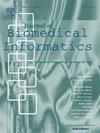Computational strategies in nutrigenetics: Constructing a reference dataset of nutrition-associated genetic polymorphisms
IF 4.5
2区 医学
Q2 COMPUTER SCIENCE, INTERDISCIPLINARY APPLICATIONS
引用次数: 0
Abstract
Objective:
This study aims to create a comprehensive dataset of human genetic polymorphisms associated with nutrition by integrating data from multiple sources, including the LitVar database, PubMed, and the GWAS catalog. This consolidated resource is intended to facilitate research in nutrigenetics by providing a reliable foundation to explore genetic polymorphisms linked to nutrition-related traits.
Methods:
We developed a data integration pipeline to assemble and analyze the dataset. It performs data retrieval from LitVar and PubMed and merges the data to produce a unified dataset. Comprehensive MeSH queries are defined to extract relevant genetic associations, which are then cross-referenced with the GWAS data.
Results:
The resulting dataset aggregates extensive information on genetic polymorphisms and nutrition-related traits. Through MeSH query, we identified key genes and SNPs associated with nutrition-related traits. Cross-referencing with GWAS data provided insights on potential effects or risk alleles associated with this genetic polymorphisms. The co-occurrence analysis revealed meaningful gene-diet interactions, advancing personalized nutrition and nutrigenomics research.
Conclusion:
The dataset presented in this study consolidates and organizes information on genetic polymorphisms associated with nutrition, facilitating detailed exploration of gene-diet interactions. This resource advances personalized nutrition interventions and nutrigenomics research. The dataset is publicly accessible at https://zenodo.org/records/14052302, its adaptable structure ensures applicability in a broad range of genetic investigations.

营养遗传学中的计算策略:构建营养相关遗传多态性的参考数据集
目的:本研究旨在通过整合多个来源的数据,包括LitVar数据库、PubMed和GWAS目录,创建一个与营养相关的人类遗传多态性的综合数据集。这一整合资源旨在通过为探索与营养相关性状相关的遗传多态性提供可靠的基础,促进营养遗传学的研究。方法:构建数据集成管道,对数据集进行组装和分析。它从LitVar和PubMed执行数据检索,并合并数据以产生统一的数据集。定义了综合MeSH查询来提取相关的遗传关联,然后与GWAS数据交叉引用。结果:所得数据集汇集了遗传多态性和营养相关性状的广泛信息。通过MeSH查询,我们确定了与营养相关性状相关的关键基因和snp。与GWAS数据的交叉参考提供了与该遗传多态性相关的潜在影响或风险等位基因的见解。共现分析揭示了有意义的基因-饮食相互作用,推进了个性化营养和营养基因组学研究。结论:本研究中提出的数据集整合并组织了与营养相关的遗传多态性信息,有助于详细探索基因-饮食相互作用。该资源促进了个性化营养干预和营养基因组学研究。该数据集可在https://zenodo.org/records/14052302上公开访问,其适应性结构确保了在广泛的遗传调查中的适用性。
本文章由计算机程序翻译,如有差异,请以英文原文为准。
求助全文
约1分钟内获得全文
求助全文
来源期刊

Journal of Biomedical Informatics
医学-计算机:跨学科应用
CiteScore
8.90
自引率
6.70%
发文量
243
审稿时长
32 days
期刊介绍:
The Journal of Biomedical Informatics reflects a commitment to high-quality original research papers, reviews, and commentaries in the area of biomedical informatics methodology. Although we publish articles motivated by applications in the biomedical sciences (for example, clinical medicine, health care, population health, and translational bioinformatics), the journal emphasizes reports of new methodologies and techniques that have general applicability and that form the basis for the evolving science of biomedical informatics. Articles on medical devices; evaluations of implemented systems (including clinical trials of information technologies); or papers that provide insight into a biological process, a specific disease, or treatment options would generally be more suitable for publication in other venues. Papers on applications of signal processing and image analysis are often more suitable for biomedical engineering journals or other informatics journals, although we do publish papers that emphasize the information management and knowledge representation/modeling issues that arise in the storage and use of biological signals and images. System descriptions are welcome if they illustrate and substantiate the underlying methodology that is the principal focus of the report and an effort is made to address the generalizability and/or range of application of that methodology. Note also that, given the international nature of JBI, papers that deal with specific languages other than English, or with country-specific health systems or approaches, are acceptable for JBI only if they offer generalizable lessons that are relevant to the broad JBI readership, regardless of their country, language, culture, or health system.
 求助内容:
求助内容: 应助结果提醒方式:
应助结果提醒方式:


